Ultra-dimensional Idol Neptunia PP
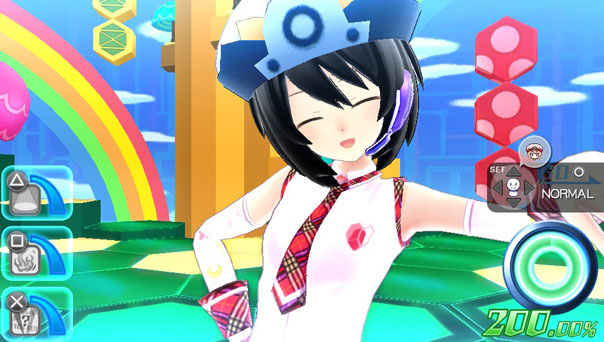
Calling me a Neptunia fan might be swinging a touch on the strong side. Not to say that I’ve not played the Neptunia games, or at least some of them. I’ve finished the first, which, honestly, was a badly designed mess of a game. I’ve finished Neptunia mk2 as well, after having suffered a great deal of hassle trying to track down a UK copy of it (it’s been re-issued over here in the mean time, thankfully, so it’s now pretty cheap), and that was much better experience all-around. I have started on the third game in the series, Victory, as well at this point, but whilst that seems polished further again, that’s kind-of been sidelined by other things. I really must get back to that.
Anyway, they released a new Neptunia game for the Vita in Japan this week, and whilst I was going to ignore it, I did discover I was only about 900 yen short of buying it on my Japanese PSN account, and I did have getting drugs pumped right next to my sciatic nerve to recover from, so I figured what the heck.
Particularly given it’s an idol game. My bailiwick and all that.
The set-up for the game, well, it’s pretty dumb – the heroines of the franchise are all chilling out gabbing on about how loved they are when, suddenly, their popularity is stricken by the rise of new pop-idol group MOB48, produced by Linda, the never-named-outside-the-OP recurring villain from Neptunia mk2 (who doesn’t actually appear here outside the ED animation either, actually). Obviously, the only way to counter this is for the CPUs become idols themselves (again, technically!), and dethrone MOB48 from the top of the charts.
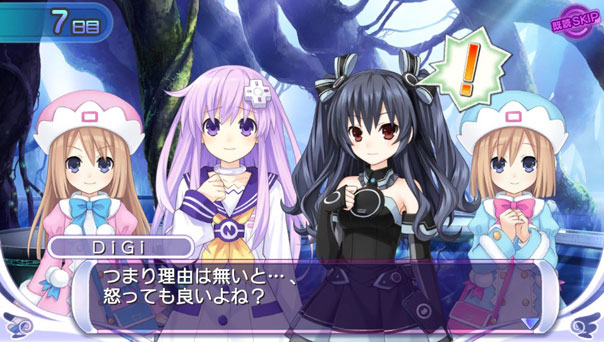
As for where you, the player, come into this, well, you’re some normal schmuck pulled into the Neptunia world to play as Producer-san. Which Neptunia world, I must confess, I’m not actually sure about – I’ve not actually gotten far enough into Neptunia V for all the alternate world shenanigans to come into play, but I do notice that they’re using all of those world and character designs for the CPUs. At the same time, though, all the CPU Candidates are present in their usual mk2 forms.
Anyway, I’m digressing somewhat – you’re the producer, you pick which of the four CPUs you want to manage and then, like with the other Neptunia games, you endeavour to make sure that the idol in your charge has the largest share of popularity in the world. To achieve this you do pretty much the same kind of things you do in other idol games – take lessons, go to events, have live performances and give them time off to recover from stress.
Here’s the thing, though – it’s actually pretty lousy as an idol game. Ultimately, all the idol trappings feel entirely coincidental – it’s a framing device for the dumb videogame jokes and the rest of the usual Neptunia humour to hang off. To a certain degree you can ignore a lot of the things that you’d typically expect to be important in idol games – the live performances and the lessons – and just focus on getting the comedic skits and event scenes through days off and appearances. Eventually, you’ll get to the point when you’ll just be one live performance and appearance in a foreign territory away from hitting the win condition anyway, even if you aren’t actively trying to achieve this.
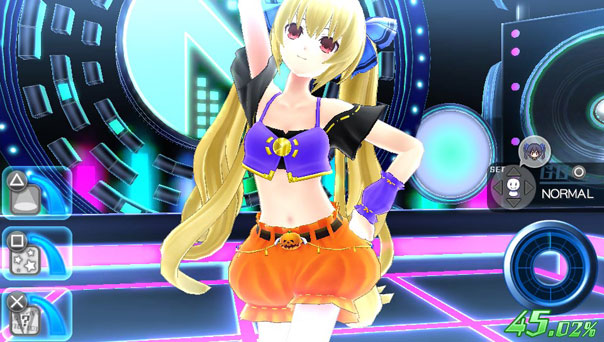
Is Blonde Noire blasphemy? Answers on a postcard!
Speaking of win conditions, that’s another one of the problems – the game enters the end-game the second you hit a 26% world popularity share. There’s no kind of score or metric to keep you actually playing once you’ve seen each characters ending. This is in contrast to something like iDOLM@STER 2, where you play more against a specific game period of 52 turns to achieve as many grade-able actions as possible as opposed to a singular, specific goal, or even just the original iM@S where you are simply looking to accumulate as many fans as possible within the games timeframe. It’s something you can repeat and improve, and there’s a certain degree of satisfaction in seeing your Producer Rank rise over successive games.
In Neptunia PP, your actual performance as Producer, it turns out, is ultimately kind-of meaningless in terms of even what ending you get. There’s three different endings for each of the CPUs – there’s the easy-to-avoid Bad Ending which crops up if you get them over-stressed, but otherwise you’ll get either the Good or True ending once you get to the end. The actual trigger for the True ending is actually derived from hitting certain events and picking certainly dialogue options, at least as far as I’ve been able to ascertain (I’ve only seen Blanc True End, but at this stage even the Japanese fan wiki’s and 2ch still seem unclear on specific requirements). The way this ties back into the actual idol gameplay is, rather than being based on your performance, that certain event scenes are locked behind a couple of your idols stats being pumped up to certain levels. The real side-effect of this is simply to pad the game out – your first time through the game, you’ll probably see the ending credits for the Good End after about three hours. You can, however, load your completion data and start again with all your CPUs stats where they were when you finished.
Whilst I wouldn’t necessarily say it’s impossible to hit the True End your first time through if you know exactly what you are doing, it’s pretty unlikely – you’d have to go against the way the game is actually telling you to play it, and very deliberately stretch things out all the way to the end of the 180 turns the game will apparently let you take. Realistically, the game is expecting you to play each of the characters paths two, or more likely three, times, as by your third time through with any particular CPU you’ll be at the point where you’re more concerned with killing time until particular triggers than you are worried about being in the position to trigger romance events or pumping near-maxed stats.
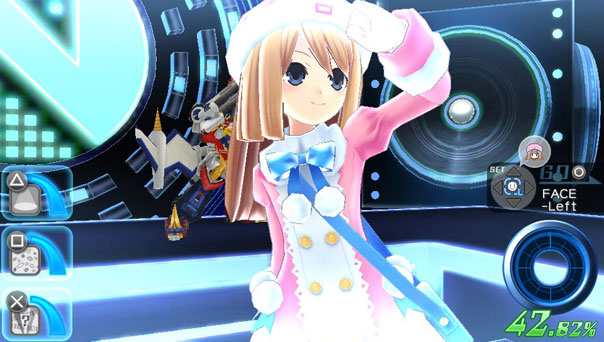
The CPU candidates, as well as If and Compa, are unlockable backing dancers, as well as for the token anime-game clock mode
As for the other gamey parts of PP, the lessons are just menu options as opposed to mini-games like iM@S, so that just leaves the stage performances. In the stage performances, you have control of the camera using the analogue sticks and d-pad, and can also trigger up to three different stage effects (such as a spotlight, or explosions). The effects are on different cooldown periods – these actually have an effect on your score, and the length of the cooldown period is based on how big the effect is. You’re basically looking to spam these as soon as you hear the crowd cheering, for maximum effect.
You can also transform your idol into her Goddess form as well – the length of the period she’ll transform for is based on her Vocal stat – for which period any increments to your Stage Point gauge will be doubled. The rather annoying thing about that, though, is that you can only use that if you only have the one CPU in your unit, and even then it’s only available for the one specific song for each of the CPUs.
Here’s the really dumb thing about the performances, though – camera manipulation actually increases your Stage Points. What this actually means is that it basically encourages you to simply jam one of your analogue sticks down in a single direction for the entirety of the performance, as your gauge will keep increasing even when the camera stops moving as long as it’s still held down. Honestly, there’s a limit to how interesting staring at your idols arse for the duration of a song can be. It really boggles my mind as to why they’d design a performance system where they pretty much actively dissuade you from actually properly watching what is happening on stage. The scores are pretty easy to max out after your first playthrough as a CPU, too.
As for the rest of the games presentation, it’s pretty OK. The character portraits in the dialogue sequences are like in the original Neptunia and Victory as opposed to the randomly-appearing 3D models of mk2, being those slightly-weird looking vectory illustrations with small degrees of movement. Most of the game is controllable via either the standard controls or the Vitas touch-screen, though there’s a few random information screens where they seem to have forgotten to put touchable exit buttons on, betraying a little lack of polish. There’s only five different songs for performances in the game – one for each of the CPUs (the other three unlock as you progress down a characters route, though), and a specific song for the final performance. The songs are alright – nothing super-memorable, and certainly little that’s a patch on the average iM@S track, but if you have any tolerance of anime-music at all then they aren’t going to have you stabbing your eardrums with pencils or anything.
The stage performances are all pretty reasonably animated, too. They don’t have iM@S-level cel-shading, some of the triggered effects look pretty goofy, and there’s an awful lot of clipping going on if you don’t strip the Goddess forms of their accessories, but the character models used are pretty good, and it usually manages to hold a steady 60fps even when you’ve got three characters on stage. They could probably have done with more stage costumes, even if it was just more colour variations in the four or five base costumes I’ve unlocked for each character, but there’s plenty of hair and face accessories to use. The silly crowd animation makes me smile as well, simple as it is.
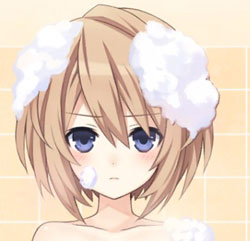
Family blog, sorry!
I’ve only actually stumbled across one CG in each of the paths – a not-particularly hard-to-find, not especially explicit bathing scene for each of the characters. There may be more, but given I’ve hit about 90% completion of all of Noires events at least, they’re pretty well hidden if there are. There’s plenty of dialogue events in the game, though, and the game keeps a percentage track of those you’ve seen for each of the characters (there’s trophies tied to viewing all of them as well). The slightly annoying thing with that is, due to the way the game is set-up to expect you to play each route several times, that the dialogue skip function is horrifically slow, which just serves to pad the game out longer.
It strikes me at this point, when I’m about to conclude, that I’ve come across way harsher than I probably should be – I’ve actually had an awful lot of fun with the game, and, much to my embarrassment, I’ve probably clocked up a good twenty hours on it the past couple of days, having done little other than play it when I’ve been sat at home. These last few IF/Compile Heart games have been really frustrating to play, though, as they’ve started to actually get close to making a decent game, and Neptunia PP has got the component elements of something far more sound then they actually ended up making – there’s just a few really, really dumb design decisions that really hold it back as an overall experience.
To be honest, it almost seems unfair to be complaining about that in a Neptunia game – they’ve always been more about providing a framework to deliver really dumb gaming jokes and goofy character moments than they have been about anything else, with even the narratives to the games are wafer thing. I’m kind of curious as to what they’re actually going to do with the TV anime that’s starting up shortly in that regard.
Also, it’s kind of weird that they’ve made a Neptunia music game in which 5pb doesn’t make an appearance, but they’ve really cut the cast back on this one to the minimum. I’ve not even actually seen If or Compa outside of a loading screen, one specific menu and the ending credits. Maybe they’re in Vert’s route, which I haven’t actually touched yet.
As a final note, the ending credits to this are pretty amazing. Like with some of the other Neptunia games, it features Neptunia renditions of other games, but being a music-related game, they’ve mined that territory pretty deeply, and not with just some of the really obvious ones. Take a look at these examples.
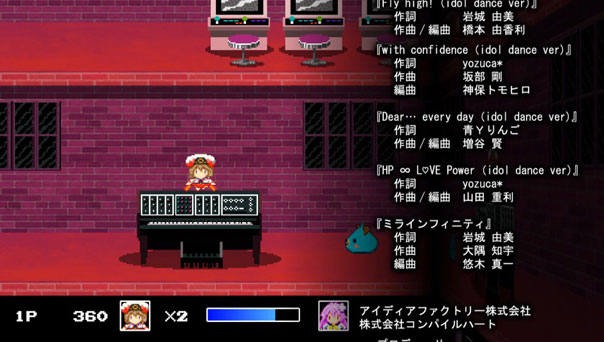
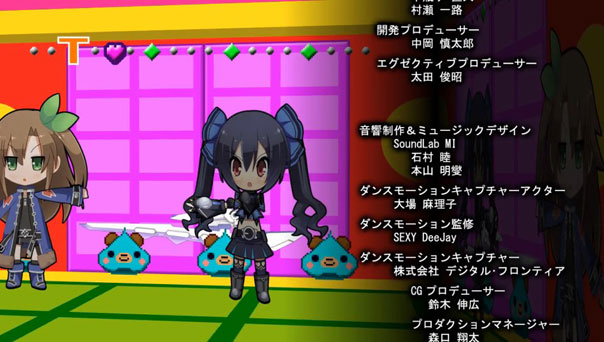
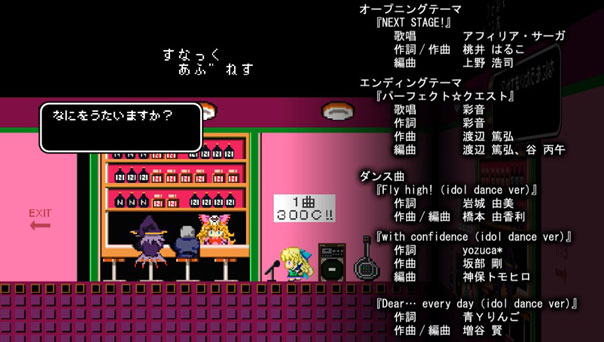
At least one of those is reference to a game that’s considerably better known in Japan, admittedly (having never been released in any other territory), but you’ll probably recognize it as being something particularly hateful if you’re a fan of Game Center CX…
